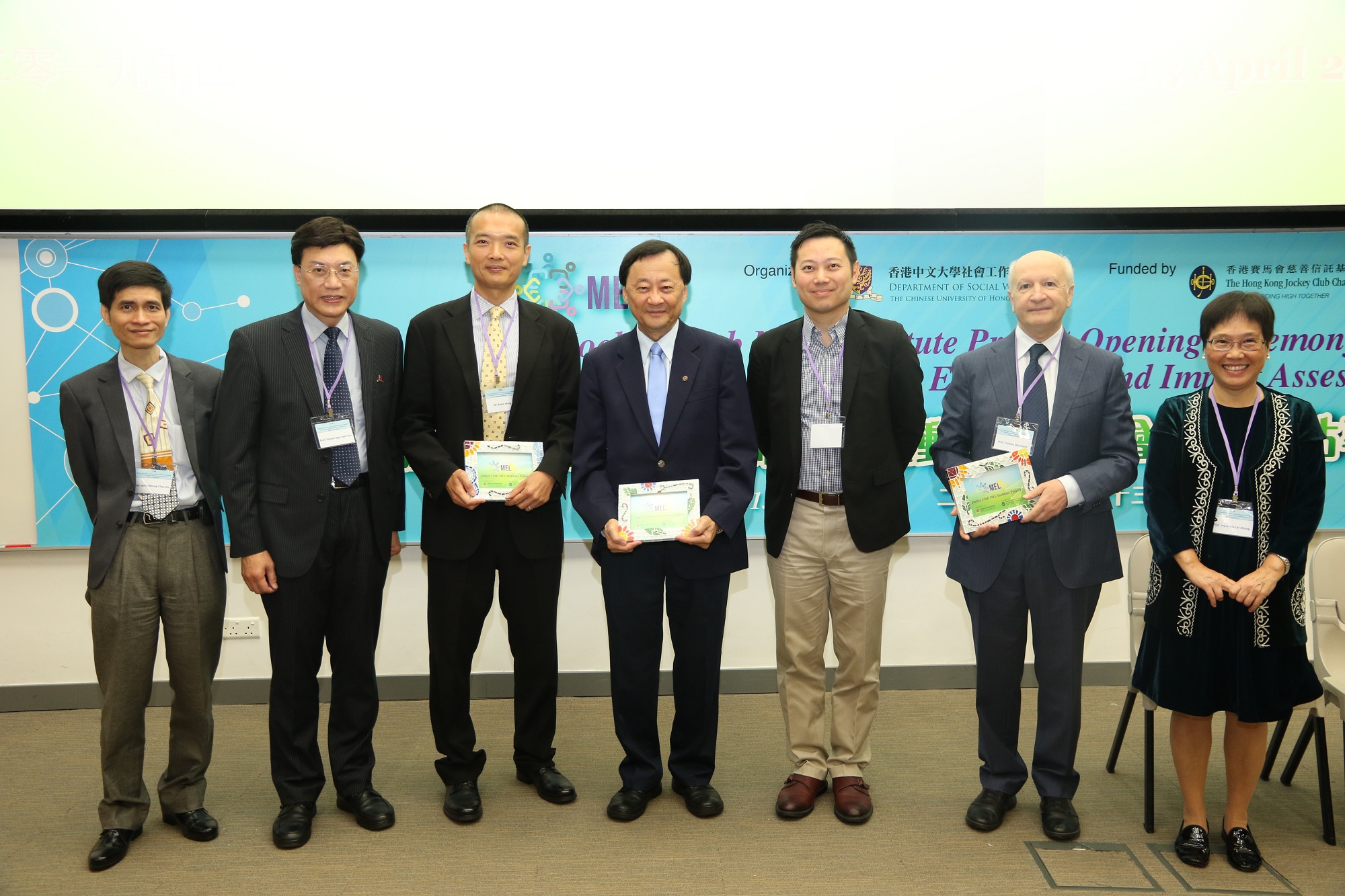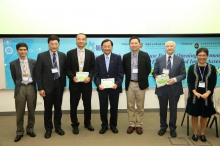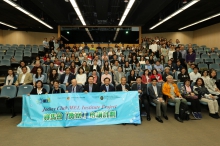CUHK
News Centre
CUHK Launches Jockey Club MEL Institute Project Opening Ceremony cum Symposium on Programme Evaluation and Impact Assessment
The Department of Social Work of The Chinese University of Hong Kong (CUHK) has launched the Jockey Club MEL Institute Project (the “Project”). Funded by The Hong Kong Jockey Club Charities Trust, the Project aims to provide a certificate training course and mentored practicum, to be augmented by an online knowledge hub, with the goal of sharing knowledge and experience of Monitoring, Evaluation and Learning of (MEL) with participants.
The opening ceremony cum symposium was held today (13 April) at CUHK, officiated by Mr. Caspar Tsui Ying Wai, Under Secretary for Labour and Welfare, Hong Kong SAR Government, Professor Benjamin Wah Wan Sang, Provost of The Chinese University of Hong Kong and Mr. Bryan Wong, Executive Manager, Charities (Strategy and Business Management), The Hong Kong Jockey Club. In addition to the opening ceremony, Professor Tiziano Vecchiato, an internationally renowned scholar and expert in social impact assessment, was invited to deliver the keynote presentation: “MEL culture & GIA approach to make the difference: European Experience”. Principal investigators of the Project including Professor Steven Ngai Sek Yum from Department of Social Work, CUHK, Professor Joyce Ma Lai Chong from Department of Social Work, CUHK, and Professor Jacky Cheung Chau Kiu from Department of Social and Behavioral Sciences, City University of Hong Kong introduced the training course and online knowledge hub.
One of the key factors in implementing and maintaining sustainable development in a social service project is to master systematic evaluation mechanisms and methods. Although many NGOs are providing services at high, professional standards, they lack an organised system and resources to evaluate their programmes. They miss opportunities to accumulate highly valuable experience and, in turn, the public may not realise the effectiveness and social impact of their services. The MEL framework provides rigorous and comprehensive training in programme evaluation. With the application of the MEL framework, the effects of services are amplified, thereby improving the capacity and sustainability of NGOs.
The Hong Kong Jockey Club Charities Trust is one of the world’s top ten charity donors and has designated the Youth, the Elderly, Sports, and Arts, Culture and Heritage as its four strategic focus areas. A survey conducted by the Charities Trust in 2018 revealed that local NGOs agreed MEL was important to their work. It is hoped that, through supporting the Jockey Club MEL Institute Project, MEL standards in the sector could be raised.
Professor Benjamin Wah Wan Sang, Provost of CUHK, said, “With this project conducted by Professor Ngai and his research team, the impact of NGOs’ services will surely be enhanced, and that impact will be more fully conveyed to different stakeholders.”
Mr. Caspar Tsui Ying Wai, Under Secretary for Labour and Welfare, Hong Kong SAR Government, said, “The monitoring, evaluation, and learning (MEL) framework provides a flexible approach to increasing project effectiveness and impact through comprehensively addressing the nature and characteristics of NGOs; social service administration and management in terms of programme planning, implementation, and evaluation; and a rigorous assessment of social impact.”
Following the opening ceremony, a keynote presentation was held. Professor Tiziano Vecchiato addressed the following questions: “how to monitor, measure, and evaluate the results of social projects in a local community”; “how to do it in a collaborative learning environment between NGOs able to get the most out of the resources available to them”; “how to do it with sustainable solutions and with a better cost result and cost effectiveness index”; as well as “how to value the social impact indexes obtained.” The keynote presentation provided examples of the above-mentioned issues, highlighting the results obtained with multicentre projects carried out in Italy and Europe.
Professor Steven Ngai Sek Yum, Project Investigator, introduced the Project details to over 200 guests. He said, “An interdisciplinary team of experienced local and overseas trainers and mentors will coach NGO practitioners through training courses and the mentored practicum. Augmented by an e-learning knowledge hub, we hope to help local NGO practitioners develop effective evaluation mechanisms and methods.”
While a number of local trainers and mentors of the Project attended the ceremony cum symposium, three overseas trainers presented the key points of their training sessions through videos. Professor Cinzia Canali, the director of Zancan Foundation, said she would be happy to share with participants all of her experience in terms of results, outputs, outcomes, and impact, as well as the methods and tools that were adopted for evaluation. She hoped that all the information she shared would be interesting and useful for the participants. In addition, Professor Aron Shlonsky, Department of Social Work at Monash University, explained that he would cover research designs, sampling and data collection, the potential measurement tools the participants might want to use, and designing studies for the easiest use of statistical sets.
Utilising the methods and tools of programme evaluation will continuously improve the quality of social services, which will eventually bring benefits to society as a whole. Through the Project, the participants should be able to continuously learn and interact, as well as develop suitable programme evaluations to promote the social impact of social services.
About the Jockey Club MEL Institute Project Certificate Training Course
The duration of the Project is three years, providing a total of four rounds of training courses. Two rounds of courses take place in each of the first two years. Each round includes courses of seven days within two months. Additionally, participants will be divided into teams for a four-month-long mentored practicum. The participants will gain practical knowledge and skills in programme evaluation to apply to their work with coaching by experienced mentors. After the completion of the courses each year, a pitching competition will be held. Those teams who win these competitions will be sponsored to showcase their good practices at internationally renowned conferences.
First round of training: Seven consecutive Thursdays starting from 12 September 2019
Second round of training: Seven consecutive Fridays starting from 13 September 2019
Time: 9:30am – 5:00pm
Location: The Chinese University of Hong Kong, Sha Tin (Exact location to be confirmed)
Online application: https://cloud.itsc.cuhk.edu.hk/webform/view.php?id=7123672
For enquiries: (Tel) 3943 7508 / 3943 3255 (Ms. Ng)
(Email) hwng@cuhk.edu.hk
Officiating guests at the Opening Ceremony: (from left) Prof. Jacky Cheung Chau Kiu, Department of Social and Behavioral Sciences, City University of Hong Kong; Prof. Steven Ngai Sek Yum, Chairperson of Department of Social Work, CUHK; Mr. Bryan Wong, Executive Manager, Charities (Strategy and Business Management), The Hong Kong Jockey Club; Prof. Benjamin Wah Wan Sang, Provost of CUHK; Mr. Caspar Tsui Ying Wai, Under Secretary for Labour and Welfare, Hong Kong SAR Government; Prof. Tiziano Vecchiato, Board Member, Zancan Foundation (Padova, Italy); Professor Joyce Ma Lai Chong, Department of Social Work, CUHK





